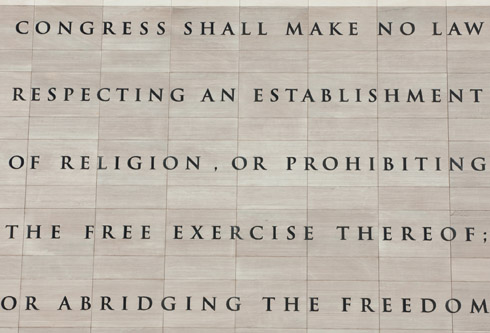
She’s spot-on the phony “War on Women” too. Here’s what she said a few weeks back in an article from the Washington Times shortly after the stealth lawsuits were launched,
The controversy swirling around the mandate from the Department of Health and Human Services, which forces religious institutions to provide insurance coverage for contraceptives, sterilizations and abortion-causing drugs for their employees, escalated this past week.
This time, it’s the good guys on the offensive.
In 12 courts, 43 Catholic institutions have filed suit against the Obama administration and its agencies, asserting that the contraceptive mandate violates the religious freedom of faith-based institutions.
In a statement explaining why the University of Notre Dame has joined the lawsuits, the university’s president, the Rev. John I. Jenkins, put the issue simply: The case is “about the freedom of a religious organization to live its mission, and its significance goes well beyond any debate about contraceptives.”
Don’t miss this point: The free-exercise clause is about living our religious beliefs, not just about how we worship. It protects our ability to integrate our faith into what we say and what we do in the public square, not just within our churches, synagogues or mosques.
The Obama administration long has attempted to recast religious freedom as mere freedom to worship. Why? Because to the left, religion (and Judeo-Christian morality) is sort of like secondhand smoke — some people like it, but on the whole, it harms society — so it must be banned from public spaces and limited to restricted areas (churches, temples and mosques).
The troublesome First Amendment right to free exercise of religion, then, becomes mere freedom of worship. And so, outside of their houses of worship, religious believers would have no right to free exercise and therefore no right of conscientious objection.
When Christians or other believers engage in humanitarian work (at hospitals, soup kitchens, shelters for the homeless) their consciences are not welcome. Moral views and conscientious objection must be bound, gagged and shut in the closet. (In fact, liberal supporters of the contraceptive mandate don’t even acknowledge that conscience exists and demands respect — for them, any exercise of conscience is obstructive “religious refusal.”)
It’s vital that all of us, no matter what we think about contraception, stay focused on what’s at stake here: the free exercise of religion.
I agree with her, of course. What’s that? You don’t have a religion? Come and meet ours. It’s full of wild and wonderful assertions that are anathema to tyranny. Thoughts like these, which are as necessary to support a life lived in freedom as air is to vivify it.
The salvation offered in its fullness to men in Jesus Christ by God the Father’s initiative, and brought about and transmitted by the work of the Holy Spirit, is salvation for all people and of the whole person: it is universal and integral salvation. It concerns the human person in all his dimensions: personal and social, spiritual and corporeal, historical and transcendent.
It begins to be made a reality already in history, because what is created is good and willed by God, and because the Son of God became one of us” (Gaudium et Spes). Its completion, however, is in the future, when we shall be called, together with all creation (cf. Rom 8), to share in Christ’s resurrection and in the eternal communion of life with the Father in the joy of the Holy Spirit. This outlook shows quite clearly the error and deception of purely immanentistic visions of the meaning of history and in humanity’s claims to self-salvation.
Immanentistic is a mighty obscure word. I looked it up and found that it means any of several theories according to which God or an abstract mind or spirit pervades the world. I get that. Continuing on,
The salvation offered by God to his children requires their free response and acceptance. It is in this that faith consists, and it is through this that “man freely commits his entire self to God” [Dei Verbum], responding to God’s prior and superabundant love (cf. 1 Jn 4:10) with concrete love for his brothers and sisters, and with steadfast hope because “he who promised is faithful” (Heb 10:23). In fact, the divine plan of salvation does not consign human creatures to a state of mere passivity or of lesser status in relation to their Creator, because their relationship to God, whom Jesus Christ reveals to us and in whom he freely makes us sharers by the working of the Holy Spirit, is that of a child to its parent: the very relationship that Jesus lives with the Father (cf. Jn 15-17; Gal 4:6-7).
A free response, because God has gifted us with free will. This is no “master/slave” relationship! Unlike with our natural parents, this time around we are free to choose to be involved in our relationship with God. And the covenant he has sealed with his adopted children cannot be severed. How? That’s the Good News.
The universality and integrality of the salvation wrought by Christ makes indissoluble the link between the relationship that the person is called to have with God and the responsibility he has towards his neighbor in the concrete circumstances of history. This is sensed, though not always without some confusion or misunderstanding, in humanity’s universal quest for truth and meaning, and it becomes the cornerstone of God’s covenant with Israel, as attested by the tablets of the Law and the preaching of the Prophets.
Yeah, the bold is my emphasis. That’s the big question of life.
This link finds a clear and precise expression in the teaching of Jesus Christ and is definitively confirmed by the supreme witness of the giving of his life, in obedience to the Father’s will and out of love for his brothers and sisters. To the scribe who asks him “Which commandment is the first of all?” (Mk 12:28), Jesus answers: “The first is: ‘Hear, O Israel: the Lord our God, the Lord is one; and you shall love the Lord your God with all your heart, and with all your soul, and with all your mind, and with all your strength’. The second is this: ‘You shall love your neighbour as yourself’. There is no other commandment greater than these” (Mk 12:29-31).
The two greatest commandments on which the whole law hinges. These are not half-baked thoughts by any stretch of the imagination.
Inextricably linked in the human heart are the relationship with God — recognized as Creator and Father, the source and fulfilment of life and of salvation — and openness in concrete love towards man, who must be treated as another self, even if he is an enemy (cf. Mt 5:43-44). In man’s inner dimension are rooted, in the final analysis, the commitment to justice and solidarity, to the building up of a social, economic and political life that corresponds to God’s plan.
It all sort of reminds me of a song, the chorus of which goes like this,
You can choose a ready guide in some celestial voice.
If you choose not to decide, you still have made a choice.
You can choose from phantom fears and kindness that can kill;
I will choose a path that’s clear-
I will choose Free Will.
Me too! Join the boys from Rush as they sing the whole song while doing their laundry.











